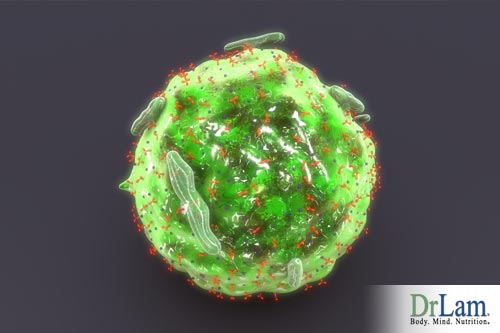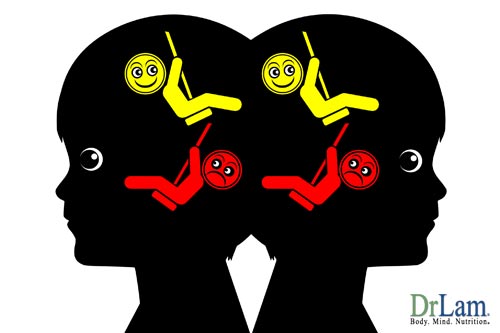
 A neurotransmitter imbalance can be the reason behind symptoms such as: depression, insomnia, weak memory, unsolicited weight loss or gain, and countless other concerns affecting us today. Many believe an active and busy lifestyle is to blame, but continue living fast paced lives, until symptoms become unmanageable. Chronic stress has profound effects on physical and mental health. People with symptoms should speak to their doctors and discuss the possibility of an imbalance of neurotransmitters.
A neurotransmitter imbalance can be the reason behind symptoms such as: depression, insomnia, weak memory, unsolicited weight loss or gain, and countless other concerns affecting us today. Many believe an active and busy lifestyle is to blame, but continue living fast paced lives, until symptoms become unmanageable. Chronic stress has profound effects on physical and mental health. People with symptoms should speak to their doctors and discuss the possibility of an imbalance of neurotransmitters.
Neurotransmitters are small chemical molecules that naturally occur in the body. They regulate brain function. These chemical transmitters assist in the transmission of signals between nerve cells. Neurotransmitters act as messengers, carrying signals, or messages, from neuron to neuron, across the synapses. These chemical pathways carry messages throughout the body and have a significant impact on mood, motivation and energy, physical and mental activity, homeostasis and the overall balance of the body. Neurotransmitters relay messages, from the central nervous system, to targeted muscle fibers, glands, and organs of the body.
Neurotransmitters are responsible for all the thoughts and actions we perform, including emotions, decisions, and expressions. They are the power that motivates us into action and the sedation that lulls us into sleep. Neurotransmitters assist the body in reacting to various stimuli in the world, physically and emotionally. When an imbalance in the transmission of these chemical messages occurs, the effects can be life changing.
Life today is be busy and often filled with stress. Long term stress, genetics, poor diet, alcohol, drug use, environmental toxins, and other factors, can affect the body’s ability to maintain the complex balance of neurotransmitters. Living in a state of chronic stress has serious consequences on all of the body systems. When the nervous system suffers greatly, damage to the neurotransmitter receptors can occur. This results in the disruption of the relay and transmission, of neurotransmitters, from the brain to the body. The effects on health can be devastating to the individual, and have negative effects on mood, weight, sleep, concentration, and more.
Neurotransmitters, and hormones, control communication pathways within the brain and between the brain and body. Through these chemical signals, the body is able to send messages to your brain concerning its needs and requirements. It can also receive the directions to do what is required. The correct balance of neurotransmitters is vital for the body to function properly and maintain optimal health.
There are basically two types of neurotransmitters in the human body: Inhibitory and Excitatory neurotransmitters.
Inhibitory neurotransmitters do not stimulate the brain, and thus, do not encourage changes in the body. These neurotransmitters tend to regulate the effect by diminishing it, calming the body and balancing mood. Serotonin and GABA are inhibitory neurotransmitters.
Serotonin is necessary for the body to stabilize the effects of excessive amounts of excitatory neurotransmitter. It regulates mood, emotions, sleep cycles, and digestion. When serotonin levels are low the immune system is often compromised and immunity against illness and disease is decreased.
GABA is required for vision, motor control, concentration, and sleep. GABA plays an important role in regulating anxiety by suppressing excitatory neurotransmitters.
 Excitatory neurotransmitters create a change in, or stimulate, the brain and induce responses in the body. These types of neurotransmitters are responsible for responding to stress and affect heart rate, blood pressure, impacting concentration, alertness, and decision making.
Excitatory neurotransmitters create a change in, or stimulate, the brain and induce responses in the body. These types of neurotransmitters are responsible for responding to stress and affect heart rate, blood pressure, impacting concentration, alertness, and decision making.
Epinephrine, also known as adrenaline, is the neurotransmitter that assists in the survival mechanism “fight or flight”, the body’s response to stress. It is also essential for body functions such as respiratory, blood pressure, and heart rate. Imbalances may result in ADHD, trouble relaxing, or sleep disturbances.
Norepinephrine works with epinephrine for the “fight or flight” response. This neurotransmitter is vital to attention and focus, as well as alertness and arousal. Low levels of norepinephrine are associated with decreased concentration, energy, and motivation. High levels are often related to anxiety or panic attacks.
Dopamine is a unique neurotransmitter, as it is considered both an inhibitory and excitatory neurotransmitter. It is essential for motivation, memory, concentration, and focus. Decreased levels of dopamine result in a decreased drive to perform tasks and an overwhelming sense of fatigue. Dopamine can be stimulated by external sources such as caffeine, ginseng, and certain medications. These substances cause dopamine to flood into the synapse and results in an increase in focus and concentration. However, using stimulants to induce the release of dopamine has a negative impact on the delicate balance of neurotransmitters.
A disruption in the production or function of neurotransmitters translates into ineffective communication and a lack of cooperation of the body and mind. If the neurotransmitter imbalance is not addressed, the effect on health is inevitable. The effects may impact both physical and mental health.
According to recent research, eight out of ten individuals suffer from a neurotransmitter imbalance. However, most will remain unaware of this problem. The following are some of the common effects of an imbalance of neurotransmitters.
Depression can vary in severity from person to person. It is estimated that more than 3.5 percent of the total US population suffers from depression. Serotonin, which is responsible for regulating sleep, appetite, and mood, has been found to be low in depressed individuals. Researchers have associated low dopamine levels with depression as well. Dopamine is the “feel good” neurotransmitter. Low dopamine equates to low pleasure and decreased satisfaction, or in other terms, depression.
Anxiety is classified as excessive worrying, nervousness, or long lasting apprehension about nonspecific situations or events. Anxiety symptoms include, but are not limited to, heart palpitations, stomach discomfort, sweating, tingling, and often a general feeling of unease. Current research associates high levels of norepinephrine and epinephrine, the excitatory neurotransmitters, with low levels of serotonin to regulate mood.
Poor Memory, Concentration, and Focus are commonly the result of a chemical imbalance. High levels of excitatory neurotransmitters are known to cause excitability and hyperactivity. Research into ADHD have found low levels of serotonin regulate mood and emotions, and that high levels of dopamine are possibly responsible for symptoms such as impulsivity and the drive for instant gratification. Researchers find that patients with Alzheimer’s disease have dramatic imbalances of neurotransmitters. Studies show that serotonin, norepinephrine, epinephrine and GABA levels drop by almost fifty percent in individuals with Alzheimer’s disease.
 Mood Swings are a common symptom of a neurotransmitter imbalance. Moods fluctuate when the mind and body are not in proper communication. Since this communication is dependent upon the intricate balance of neurotransmitters, emotions may change quickly and the individual may fluctuate in how they feel about certain things or situations.
Mood Swings are a common symptom of a neurotransmitter imbalance. Moods fluctuate when the mind and body are not in proper communication. Since this communication is dependent upon the intricate balance of neurotransmitters, emotions may change quickly and the individual may fluctuate in how they feel about certain things or situations.
Other psychological and physical disorders may occur with the imbalance of neurotransmitters. These include obsessive compulsive disorder, substance abuse, insomnia or other sleep disturbances, changes in weight, premenstrual syndrome, panic attacks, and many other disruptions to physical and mental health.
When the body is experiencing chronic stress, the neurotransmitter epinephrine, or adrenaline, is continuously secreted, and the body remains in a state of “fight or flight”. The adrenals respond by producing cortisol, also known as the stress hormone, to address the current threat of survival. The result is increased heart rate, blood pressure, focus, and decision making. Cortisol decreases the body’s system functions that are not crucial for survival, including the digestive, reproductive, and immune systems. This is important when survival is threatened, as the “fight or flight” response heightens the senses and has the amazing ability of thinking critically and assessing the best chances for escape, attack, or survival. This response has enabled humans to survive under extreme conditions, to hunt with precision and accuracy, and to avoid unpredictable moments of danger. However, in current times these threats to survival are not as common. Yet, the body responds in similar fashion to today’s stressors, such as running late to an appointment, financial woes, or relationships troubles.
This response is referred to as the NeuroEndoMetabolic (NEM) Stress Response and is the body’s natural defense against stress. The NEM stress response is triggered by positive and negative stressors in life. The NEM response is activated by the stress from positive milestones, as with traumatic life events. It is the same, cortisol is released and the body systems are negatively affected.
The NEM stress response of the adrenals is designed for short term threats to survival. When the response is constant, due to chronic stress, the adrenals become overworked. The result is often Adrenal Fatigue Syndrome. Unfortunately, the symptoms of Adrenal Fatigue Syndrome are often overlooked by the conventional medical community and go untreated, as are neurotransmitter imbalances. The most common signs of Adrenal Fatigue Syndrome (AFS) can include insomnia, inability to handle stress, depression, anxiety, cold hands and feet, brain fog, memory and concentration problems, constant fatigue, low libido, and much more. When left untreated, Adrenal Fatigue Syndrome may continue to worsen. The advanced stages of Adrenal Fatigue can be devastating, with debilitating effects to the physical and mental health of the individual.
Restoring balance to the body and mind is essential in the recovery from Adrenal Fatigue Syndrome and neurotransmitter imbalance. Reducing stress and making important lifestyle changes, like the following methods, will increase healing and speed recovery.
 Exercise is key for achieving and maintaining optimal health. Sufferers of Adrenal Fatigue Syndrome and neurotransmitter imbalances may find exercise difficult. It is important to begin slowly and start with low impact gentle forms of physical activity, such as: Yoga, Tai Chi, and walking.
Exercise is key for achieving and maintaining optimal health. Sufferers of Adrenal Fatigue Syndrome and neurotransmitter imbalances may find exercise difficult. It is important to begin slowly and start with low impact gentle forms of physical activity, such as: Yoga, Tai Chi, and walking.It is important to always consult your primary care provider if you experience symptoms that are common with neurotransmitter imbalance and AFS. A neurotransmitter test may be beneficial. Its test typically consists of a blood or urine test and are relatively inexpensive. Taking a neurotransmitter test may offer insight into hormonal, psychological, and physical problems and provide options for treating them.
The body relies on a delicate balance of neurotransmitters to relay chemical messages from the brain to body. Mood, emotions, memory, digestion, circulation, reproduction, and much more are affected when an imbalance occurs in this intricate system. Chronic stress may trigger a malfunction of this system and AFS may result.
Balancing the body and mind is essential to regaining and maintaining optimal health. Restoring neurotransmitter balance and treating Adrenal Fatigue Syndrome begins with dietary and lifestyle changes to reduce the overall stress on the body. Providing the body with exceptional nutrition and clean water is crucial. Learning new techniques to manage and decrease stress is key to recovery. Gentle Yoga, meditation, acupuncture, and other mind/body therapeutic methods have a positive impact on health and healing.
